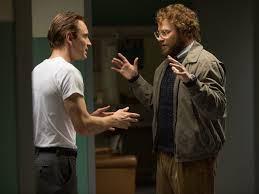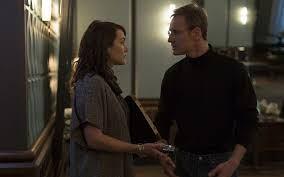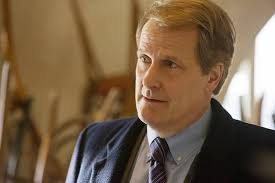It must be difficult to be a genius. I don’t mean that sarcastically or flippantly, even though such a statement could be read in that fashion. I mean it sincerely. There must be something so frustrating about waiting for everyone else’s intellect to catch up to your own, having to rudimentarily explain concepts your brain grasps so easily. Geniuses rarely take their work seriously, because to them it seems like play. It comes effortlessly, and you can’t help but have some contempt for those who don’t see what you so easily see. You’re Stephen Sondheim in an Andrew Lloyd Webber world, and it would have to feel suffocating and stifling.
Early on in the fascinating, not quite a bio-pic, Steve Jobs, Jobs is pointedly asked, “who are you.” It’s a question posed by his partner and friend, Steve Wozniak (well-played by Seth Rogen), demanding to know why Jobs, who is neither engineer nor programmer, is hailed as the genius behind Apple’s success. Yet it also speaks to the question at every biographical film’s heart: who is this person, and why is he compelling enough to warrant a film?

I’m not entirely certain I can say I understand the man who was Steve Jobs any more than I did when I started the film. He remains the same mystery wrapped up in an enigma that he was when the opening credits began, but it’s that second question that the film answers so very, very well. Jobs (brilliantly brought to life by Michael Fassbender) isn’t inherently knowable (or perhaps even likable), but he is a fascinating individual.
The film, penned by snappy, articulate dialogue creating Aaron Sorkin and directed with kinetic energy by Danny Boyle, takes on a three-act structure, each act centered on the backstage drama of a new product launch. It owes as much to All that Jazz as it does to Apple. We see Steve Jobs stressing product minutiae, arguing with friends and allies, and dealing with the family drama that comes with an estranged former girlfriend and daughter. It seems as though everyone defines launch days as the time in which emotional grievances must be aired. He’s flanked by Joanna Hoffman (perfectly realized by Kate Winslet), the person who cares about others so Jobs doesn’t have to, frequently forced to clean up the messes his lack of regard for others causes.

There’s a pattern to each launch. Jobs prepares to dazzle the world, callously disregards those who happen to be nearby, has a meaningful conversation with his daughter (presented as a child, a pre-teen, and a college-attending young adult), and comes close to some sort of emotional breakthrough only to stop just at the precipice. You could almost set your watch to each act’s plot mechanics, but it’s the details within this narrative skeleton that gives the film its liveliness and electricity. It takes its narrative confines and breaks free of them, creating scenarios in which Jobs comes face to face with his emotional and intellectual failings just prior to his next technological risk.
Steve Jobs has been criticized for its less than factual account of Jobs’s life. That, however, is not film criticism, so its relationship to reality is irrelevant to me. After all, this is a film about Steve Jobs with no mention of an iPhone or the cancer that ultimately took his life. Instead, it’s an attempt to present him as a man with many emotional demons, who does care for some individuals in his life, but has no way of showing it. What really matters involves whether or not the film engaged me, and I have to say it did. The film works because the performances and the script are strong.
Michael Fassbender remains a fascinating actor, impossible to peg. He seems equally at home in a superhero franchise or wearing a paper mache head in an avant-garde rock band. I stated above I don’t know if I really understand Jobs any better than I did at the film’s start, but that doesn’t mean Fassbender is giving a weak performance. He ensures Jobs emerges as both a temperamental genius and a flawed, sympathetic human being. He may be a dictator in sneakers, but there’s a wounded soul visible beneath all that remains unsaid. For Fassbender’s Jobs, emotions are weaknesses that could be exploited, so he must keep them close to the vest. It means we don’t gain much access into his inner workings, but there’s a sense of understanding that comes from this closed-off portrayal. It’s not that he looks like Steve Jobs (as he obviously doesn’t), but he embodies the spirit of the character, and that’s what’s important.
Seth Rogen, Kate Winslet, and Jeff Daniels (as former boss/ mentor John Scully) all give nuanced, sympathetic performances as characters who care about Jobs, but find actually connecting to him nearly impossible (It’s no coincidence the film places such an emphasis on Jobs’s insistence his computers are “closed” and incompatible with other technology brands). Rogen sees him as a friend, but a friend who might drop him at a hat’s drop, and he plays that mixture of affection and wary frustration perfectly. Winslet, who is nearly incapable of giving a bad performance, functions as the chilly, intellectual film’s emotional center. She’s the soul who sees the emotional damage present in both Jobs and those he leaves in his wake, and the only person who can tell him exactly how terrible he’s being. She’s the essential presence that can point out how both brilliant and awful out titular character can be. Daniels (already familiar with Sorkin’s dialog from his Newsroom stint), personifies the man who sees Jobs as a son, but recognizes Jobs may be the type who will turn on a father figure when challenged. He appears as both proud supporter and angry, betrayed castoff.

All of these actors have the unenviable task of taking Aaron Sorkin’s wordy, clever dialog and making it sound natural coming out of their mouths, and they do so with aplomb.
It’s nearly impossible to see this film and not view it as a companion piece to Sorkin’s previous film, The Social Network and its anti-hero Mark Zuckerberg. Both feature inherently unlikable, genius protagonists, with an inability to form human connections. Both films revel in the irony that these individuals so incapable of bonding with those in their inner circles created technology that brought the world closer together. It’s obvious Sorkin has a fascination with flawed brilliance, and given his reputation, it’s equally possible that he might specifically identify with the difficult, exceptional mind. Social Network is probably the better film. It’s more linear and less episodic than Steve Jobs’s narrative structure will allow. What the film shows us is a limited portrait of a complicated, closed-off individual, who couldn’t understand the present because he was too fixated on the future. Near the end of the film, Steve Wozniak claims, “It’s not binary. You can be decent and gifted at the same time.” That line sort of sums up everything the film has to offer, though it doesn’t prove the sentiment correct or flawed. Jobs might hear and acknowledge it, but he probably didn’t ponder it for too long. His mind was already somewhere else.

